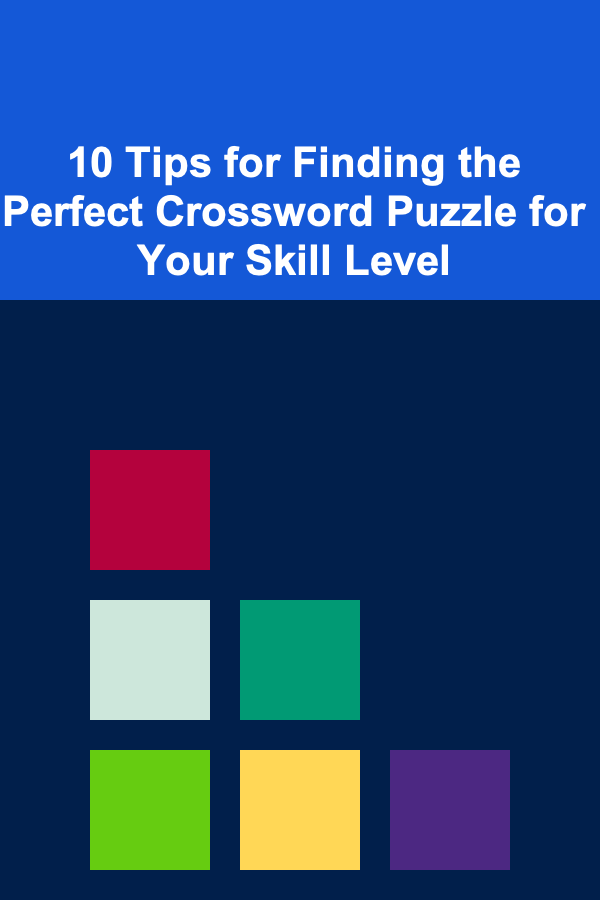
10 Tips for Finding the Perfect Crossword Puzzle for Your Skill Level
ebook include PDF & Audio bundle (Micro Guide)
$12.99$11.99
Limited Time Offer! Order within the next:

Crossword puzzles are a popular form of entertainment that combine fun and mental exercise. They challenge your vocabulary, knowledge, and problem-solving abilities, while also offering a sense of accomplishment when completed. However, finding the right crossword puzzle for your skill level can be a bit tricky, especially if you're new to crosswords or are looking for a challenge that suits your expertise. In this article, we'll explore 10 tips to help you find the perfect crossword puzzle that fits your skill level, ensuring that you get the most out of your puzzle-solving experience.
Understand Your Skill Level
Before you start looking for crossword puzzles, it's essential to evaluate your current skill level. Are you a beginner who is just starting to explore crossword puzzles? Or are you an experienced solver looking for a challenge? Identifying where you stand will help you choose puzzles that are neither too easy nor too difficult.
- Beginner: If you're new to crosswords, you might want to start with simpler puzzles that feature more straightforward clues and a smaller grid. These puzzles often focus on common words and phrases.
- Intermediate: If you have solved a few puzzles but still find some of them challenging, look for puzzles that strike a balance between difficulty and accessibility. These will have slightly harder clues but are still solvable without extensive experience.
- Advanced: Advanced crossword solvers enjoy puzzles with complex wordplay, obscure references, and intricate clues that require a deep knowledge of language, culture, and trivia.
Identifying your skill level is the first step in finding the perfect crossword puzzle.
Start with Simple Puzzles
For beginners, starting with easy crossword puzzles is crucial. Many puzzle books and online platforms offer a range of difficulty levels, and starting with easier puzzles helps you build confidence and familiarity with the solving process. Here are some characteristics of simpler puzzles:
- Smaller grids: Easier puzzles usually have fewer squares and less intricate patterns.
- Clear clues: The clues are more straightforward, often involving simple definitions or direct associations.
- Common words: Simple puzzles often use familiar and commonly used words, so you won't have to guess or resort to a dictionary frequently.
By starting with simpler puzzles, you can gradually build your solving skills and gain confidence in your puzzle-solving abilities.
Use Puzzle Platforms with Adjustable Difficulty Levels
Many online crossword platforms allow you to choose the difficulty level of the puzzles. This feature is especially useful for finding puzzles that match your skills. Platforms like The New York Times Crossword, Crossword Nexus, and others let you filter puzzles by difficulty, allowing you to start with easier ones and work your way up as you improve.
- Beginner-friendly puzzles: These platforms often have beginner categories with puzzles designed specifically for newcomers.
- Intermediate and advanced puzzles: As you improve, you can explore puzzles that increase in complexity, providing you with new challenges.
By selecting puzzles with the right difficulty level, you ensure that you're neither overwhelmed nor bored while solving.
Consider the Size of the Grid
One of the first things you'll notice about crossword puzzles is their size. Smaller grids, such as 5x5 or 7x7, are generally easier to complete and are a great way for beginners to start. Larger grids, like 15x15 or even 21x21, tend to be more complex and are often associated with intermediate to advanced difficulty levels.
- Smaller grids: These puzzles often have fewer words and simpler connections, making them less daunting for beginners.
- Larger grids: These puzzles require more time and effort, as the complexity increases with the number of intersecting clues.
Choose puzzles with smaller grids to start if you're a beginner, and work your way up to larger ones as your skills improve.
Examine the Type of Clues
The type of clues provided in a crossword puzzle is a crucial factor in determining its difficulty level. Crossword clues come in various styles, ranging from direct definitions to more cryptic or lateral thinking clues. Understanding the types of clues can help you choose puzzles that align with your skill set.
- Straightforward definitions: Beginner puzzles often feature clues that are direct and simple, with clear definitions for words.
- Wordplay and puns: Intermediate puzzles may include clues that involve wordplay, puns, or double meanings.
- Cryptic clues: Advanced puzzles often incorporate cryptic clues, which require solvers to interpret words in unconventional ways, involving abbreviations, anagrams, or hidden meanings.
For beginners, it's best to start with puzzles that feature direct definitions. As you progress, you can tackle puzzles with more creative and challenging clues.
Look for Themes in the Puzzle
Some crossword puzzles come with a theme that ties together the clues and answers. Thematic puzzles can be easier for certain skill levels because they offer hints and patterns that help you predict answers more easily. These puzzles might have clues that relate to a specific category, such as history, movies, geography, or pop culture.
- Themed puzzles: These often include related clues that provide context, making the puzzle easier to solve for beginners.
- Unthemed puzzles: These puzzles are more difficult because each clue stands alone and there are no thematic connections to help guide your solving process.
If you're a beginner, you may want to look for puzzles that feature themes to make the solving process more enjoyable and accessible.
Practice with Daily Puzzles
Another excellent way to improve your crossword-solving skills is by solving daily puzzles. Many crossword platforms, such as The New York Times, offer daily puzzles of varying difficulty levels. Starting with the easier puzzles on Monday and gradually working your way up through the week will give you the opportunity to grow your skills in a structured manner.
- Monday puzzles: These are typically the easiest and provide a good introduction to the puzzle-solving process.
- Wednesday puzzles: These puzzles represent a moderate level of difficulty and will introduce more wordplay and lateral thinking.
- Friday/Saturday puzzles: These are often the most challenging and may feature complex wordplay, obscure references, and larger grids.
By committing to daily puzzles, you'll have the chance to practice consistently and steadily improve your skills.
Use Crossword Puzzle Dictionaries and Solving Tools
When you're just starting, you might encounter words or clues that are completely unfamiliar. This is where crossword puzzle dictionaries and online solving tools can come in handy. These tools can help you:
- Find definitions: A crossword puzzle dictionary provides common crossword answers and their definitions, which can help you solve difficult clues.
- Solve anagrams: Online tools can assist with unscrambling letters when you're stuck on a tricky clue.
- Practice with word lists: Some tools offer word lists categorized by difficulty, giving you ideas for what kinds of answers to expect in different types of puzzles.
Using these tools can be an excellent way to learn new words and strategies, but remember, it's important not to rely too heavily on them if you want to improve your problem-solving skills.
Pay Attention to Puzzle Difficulty Ratings
Many crossword puzzles come with a difficulty rating, which can help you determine whether they are suitable for your current skill level. These ratings often range from "easy" to "hard," and are based on the complexity of the clues, grid size, and word choices. Make sure to pay attention to these ratings when selecting a puzzle.
- Easy puzzles: These are best for beginners and will introduce you to the basic structure and solving strategies.
- Medium puzzles: These are appropriate for solvers who have gained some experience but are still looking for manageable challenges.
- Hard puzzles: These are designed for experienced solvers and may require deep knowledge of obscure references, unusual wordplay, and advanced solving techniques.
Choosing puzzles that match your skill level based on their difficulty rating will ensure that you remain challenged without becoming frustrated.
Challenge Yourself Gradually
Finally, the best way to improve your crossword skills is by gradually increasing the difficulty level. Don't jump straight into the hardest puzzles, as this can lead to frustration. Start with easy puzzles, build your confidence, and then move on to more difficult ones. By slowly pushing yourself to tackle harder puzzles, you'll be able to develop your problem-solving skills and expand your knowledge of crossword-solving techniques.
- Start small: Begin with easy puzzles and gradually move to larger, more complex ones.
- Take breaks: If you find a puzzle too difficult, take a break and return to it later with a fresh perspective.
- Challenge yourself over time: As you become more comfortable with puzzles, you can try harder ones, experimenting with different solving strategies and methods.
By challenging yourself in this way, you will continuously improve your skills and become a more proficient crossword solver.
By following these 10 tips, you can find crossword puzzles that perfectly match your current skill level. Whether you are a beginner or an experienced solver, choosing puzzles that challenge you appropriately is key to improving your skills and enjoying the process. With consistent practice and a willingness to challenge yourself, you'll be well on your way to becoming a crossword master in no time.
Reading More From Our Other Websites
- [Home Space Saving 101] How to Conquer Clutter in Every Drawer Using DIY and Affordable Drawer Dividers
- [Personal Care Tips 101] How to Choose a Body Butter for Smooth Feet and Heels
- [Home Pet Care 101] How to Create a Pet-Proof Home for a New Puppy or Kitten
- [Personal Financial Planning 101] How to Save for Retirement When You're Self-Employed
- [Screen Printing Tip 101] Best Screen Printing Stencils: Types, Materials & How to Make Them
- [Home Family Activity 101] How to Host a Family DIY Gift-Making Party for Holidays
- [Personal Finance Management 101] How to Plan for Retirement in Your 20s
- [Home Budget Decorating 101] How to Incorporate Thrift Store Finds into Your Home Design
- [Personal Investment 101] How to Diversify Your Real Estate Portfolio
- [Organization Tip 101] How to Make Meal Prep Fun with Themed Weeks

How to Address Mental and Emotional Well-Being in Health Consulting
Read More
How to Choose Your Wedding Dress and Bridesmaid Dresses
Read More
How To Explore Decentralized Finance (DeFi) with Crypto
Read More
How to Train Your Family to Be More Aware of Home Security
Read More
How To Understand the Genetics of Allergies
Read More
10 Tips for Choosing the Right Blockchain Platform for Your Project
Read MoreOther Products

How to Address Mental and Emotional Well-Being in Health Consulting
Read More
How to Choose Your Wedding Dress and Bridesmaid Dresses
Read More
How To Explore Decentralized Finance (DeFi) with Crypto
Read More
How to Train Your Family to Be More Aware of Home Security
Read More
How To Understand the Genetics of Allergies
Read More